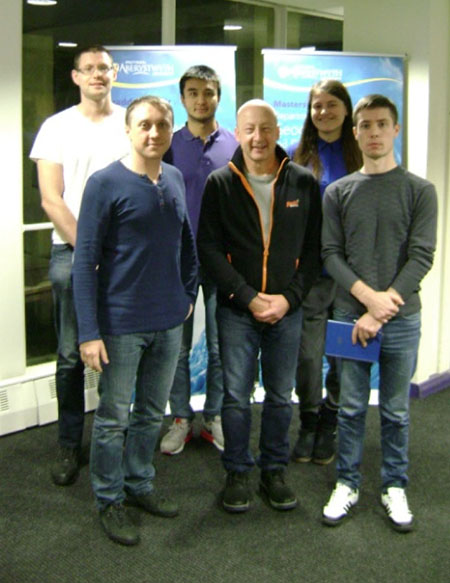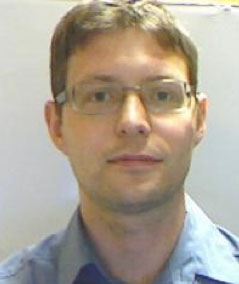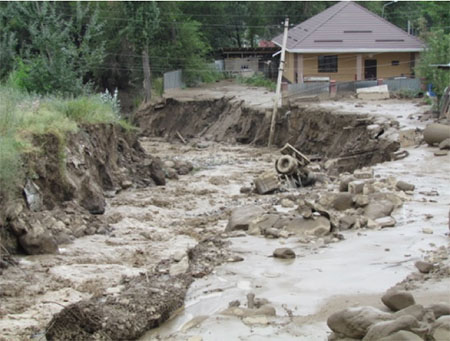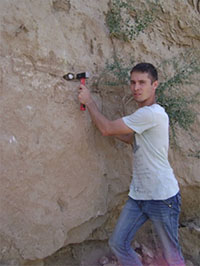News And Events
*December 2015: Official project website launched.
We proudly present the new Newton-al Farabi website. On this website, we introduce the project and provide details on the specific case studies that we are carrying out in collaboration with our project partners. Importantly we included sections to post project updates, that can range from the announcement of a future project meeting to the first scientific results and publications, and specific information on all the experts involved in this project. Currently the website is only available in English, but we soon hope to add a Russian version. During the project (until 2017) we will periodically update this website with new information and documents. We are very grateful for the help of Antony Smith (Aberystwyth University) for the design and maintenance of this website.
Nov-Dec 2015: Kazakh early career scientist arrive in Aberystwyth
 Yevgeniy Nikolayev, Maxim Dolbeshkin (both Institute of Geography), Nurzhan Mukhametkaliyev (Kazakh National Technical University after Satpaev) and Tais Reznikova (German-Kazakh University) are visiting the University as part of the British Council Newton – Al-Farabi partnership program. The program, named after the famous English physicist and a renowned scientist and philosopher from the Islamic Golden Age, represents a collaboration between British and Kazakh institutions with the aim of developing a comprehensive water management strategy in Kazakhstan, to address the issues of water scarcity, natural hazards and contamination.
Yevgeniy Nikolayev, Maxim Dolbeshkin (both Institute of Geography), Nurzhan Mukhametkaliyev (Kazakh National Technical University after Satpaev) and Tais Reznikova (German-Kazakh University) are visiting the University as part of the British Council Newton – Al-Farabi partnership program. The program, named after the famous English physicist and a renowned scientist and philosopher from the Islamic Golden Age, represents a collaboration between British and Kazakh institutions with the aim of developing a comprehensive water management strategy in Kazakhstan, to address the issues of water scarcity, natural hazards and contamination.
Professor Mark Macklin and Dr Willem Toonen from Aberystwyth University travelled to South Kazakhstan during the summer to meet with experts of Kazakh partner institutes and to collect sediment samples which will be measured for metal and radionuclide contamination. Under the supervision of their tutor, MPhil student Rhodri Bevan, the Kazakhs have been conducting numerous tasks including researching the impacts on the environment of mining and industry, gathering hydrological and policy data to assess rapid climate change and a compilation of this data in a geographic information system database. This work will contribute to the goal of developing a contamination dispersal and flood risk models that enable the Kazakh authorities to make informed water management decisions. In addition to participating in research activity, the Kazakhs are attending a range of lectures across the University to improve their understanding and to gain experience of the education system in Wales and have been on a fieldtrip to Devil’s Bridge and the abandoned Lead mines of Cwmystwyth.
Tais Reznikova: “My colleagues and I are having an amazing time at Aberystwyth – full of new knowledge and vision. I feel as if I am part of a very important process of international scientific cooperation. I am confident that the project will be a success and will contribute towards a productive scientific partnership between the UK and Kazakhstan”.
October 2015: Rhodri Bevan starts his MPhil project on contaminants in the Syrdarya region
 Rhodri Llyr Bevan is our latest addition to the Newton-al Farabi team. In the coming year he will be working on the concentration and dispersal of contaminant in the Syrdarya catchment. His first task will be to compile an overview of existing information on the location and sources of various contaminants (ranging from heavy metals to radionuclides and other hazardous compounds). He will work on this in close collaboration with the four early career Kazakh experts that will visit Aberystwyth later this year. Part of his appointment is to tutor these early career experts and guide them through the process of data collection and compilation. In the Badam and Arys rivers (near Shymkent) samples were collected during late summer. Rhodri will analyse the results, combine the concentrations of contaminants with a sediment dispersion model based on hydrologic modelling to generate risk maps for downstream regions, and publish the results in internationally peer-reviewed scientific journals. Rhodri will also attend future project meetings and join field campaigns to gather additional data. In the past Rhodri has worked on contamination related to lead mining in Wales, so he is a valuable addition to our team!
Rhodri Llyr Bevan is our latest addition to the Newton-al Farabi team. In the coming year he will be working on the concentration and dispersal of contaminant in the Syrdarya catchment. His first task will be to compile an overview of existing information on the location and sources of various contaminants (ranging from heavy metals to radionuclides and other hazardous compounds). He will work on this in close collaboration with the four early career Kazakh experts that will visit Aberystwyth later this year. Part of his appointment is to tutor these early career experts and guide them through the process of data collection and compilation. In the Badam and Arys rivers (near Shymkent) samples were collected during late summer. Rhodri will analyse the results, combine the concentrations of contaminants with a sediment dispersion model based on hydrologic modelling to generate risk maps for downstream regions, and publish the results in internationally peer-reviewed scientific journals. Rhodri will also attend future project meetings and join field campaigns to gather additional data. In the past Rhodri has worked on contamination related to lead mining in Wales, so he is a valuable addition to our team!
September 2015: Sediment samples collected from Badam and Arys rivers near Shymkent
 In August- September 2015 the first Newton-al Farabi field campaign was carried out. First several river systems in the Almaty region were visited with the help of the Institute of Geography to witness the devastation caused by recent catastrophic floods in the Talgar and Kargaly rivers. In the Talgar river, major damage was prevented by a the dam which stopped the downstream propagation of water, boulders and trees. In the Kargaly river, however, the flow mobilised boulders downstream of the dam, and damaging many houses in the densely occupied valley in the outskirts of Almaty. Both catchments are characterised by deposits of previous floods, mainly in boulder berms. In a future campaign we aim to return to these locations to date these deposits in order to compile a record of major floods of the past.
In August- September 2015 the first Newton-al Farabi field campaign was carried out. First several river systems in the Almaty region were visited with the help of the Institute of Geography to witness the devastation caused by recent catastrophic floods in the Talgar and Kargaly rivers. In the Talgar river, major damage was prevented by a the dam which stopped the downstream propagation of water, boulders and trees. In the Kargaly river, however, the flow mobilised boulders downstream of the dam, and damaging many houses in the densely occupied valley in the outskirts of Almaty. Both catchments are characterised by deposits of previous floods, mainly in boulder berms. In a future campaign we aim to return to these locations to date these deposits in order to compile a record of major floods of the past.
 In the Arys river (near Shymkent) we collected sediment samples from fluvial terraces. Using OSL-dating techniques, we will be able to date when the different terrace levels in the floodplain were formed and how the periods of river incision (erosion) and aggradation (sedimentation) relate to climate change. On the Badam and Arys river we also collected ~125 sediment samples from recent deposits of the Arys river - mainly from channel muds and overbank fines. These samples will be analysed in a specialised geochemistry laboratory in Almaty to determine the concentration of various contaminants. The outcomes will give a first indication about the type, concentration, and spatial distribution of contaminants in the Arys river catchment. Samples were taken along the full length of the river, from upstream parts of the river to downstream near the confluence with the Syrdarya river. We will use the data to calculate sediment mixing rates, to identify the main sources of contamination and where these enter the river system, and to pinpoint specific regions where the local population is under high risk. Based on the first results we will plan further activities in the region to increase our sample density and to investigate additional sources of contaminants. Provided that we can detect threatening levels of contamination in current river sediments, it is important to investigate how harmful elements may enter the food-chain by mapping and sampling local riverine vegetation that is used for grazing animals that produce meat and milk, and croplands producing vegetables and fruits that are irrigated with (or occasionally flooded by) Arys and Badam river water.
In the Arys river (near Shymkent) we collected sediment samples from fluvial terraces. Using OSL-dating techniques, we will be able to date when the different terrace levels in the floodplain were formed and how the periods of river incision (erosion) and aggradation (sedimentation) relate to climate change. On the Badam and Arys river we also collected ~125 sediment samples from recent deposits of the Arys river - mainly from channel muds and overbank fines. These samples will be analysed in a specialised geochemistry laboratory in Almaty to determine the concentration of various contaminants. The outcomes will give a first indication about the type, concentration, and spatial distribution of contaminants in the Arys river catchment. Samples were taken along the full length of the river, from upstream parts of the river to downstream near the confluence with the Syrdarya river. We will use the data to calculate sediment mixing rates, to identify the main sources of contamination and where these enter the river system, and to pinpoint specific regions where the local population is under high risk. Based on the first results we will plan further activities in the region to increase our sample density and to investigate additional sources of contaminants. Provided that we can detect threatening levels of contamination in current river sediments, it is important to investigate how harmful elements may enter the food-chain by mapping and sampling local riverine vegetation that is used for grazing animals that produce meat and milk, and croplands producing vegetables and fruits that are irrigated with (or occasionally flooded by) Arys and Badam river water.
June 2015: Start-up meeting in Almaty
The first general meeting of the Newton-al Farabi project was organised from Tuesday 23rd to Wednesday 24th June at the German-Kazakh University in Almaty, Kazakhstan. This project recently received approximately £300,000 from the British Council to establish collaboration with between experts from Kazakhstan and the United Kingdom to investigate water stress issues in a changing climate in the foothills of the Tien Shan Mountains in Kazakhstan. In addition to the general meeting, Prof. Mark Macklin and Dr. Willem Toonen (Aberystwyth University) visited the Institute of Geography, the Kazakh National Technical University after Satpayev, and the German-Kazakh University for a series of introductory lectures, and to meet established experts and young researchers that were not present at the general project meeting. The first day of the general meeting (Tuesday, 23rd June) focussed on the introduction of the research project, the grant scheme, the scientific expertise of attendees and the general introduction of the main partner institutes. The afternoon of the first day and the morning of the second day (Wednesday, 24th June) focussed on the choice of interesting collaborative research topics within the framework of water stress issues in a changing climate, gathered around the four main research topics; (i) water quality, (ii) floods and droughts, (iii) climate change, and (iv) water stress policies. Based on this division an inventory was made of available data sets and expertise, and a selection was made of suitable research areas in which additional supplementary data can be gathered and in which different research case studies can be integrated. In the afternoon the discussion focussed on establishing a framework that allows for the training of early career Kazakh scientist by assisting data collection in the field, supporting laboratory analysis of their samples, arranging traineeships at Aberystwyth University, the exchange of information and data, and the publication of results. The meeting was concluded with a short outlook on anticipated outcomes of this project and the organisation of future project meetings. Last, we are happy to announce that the Al-Farabi National University (Almaty) has officially joined our project, and we hope to benefit from their expertise in regional climate change.
